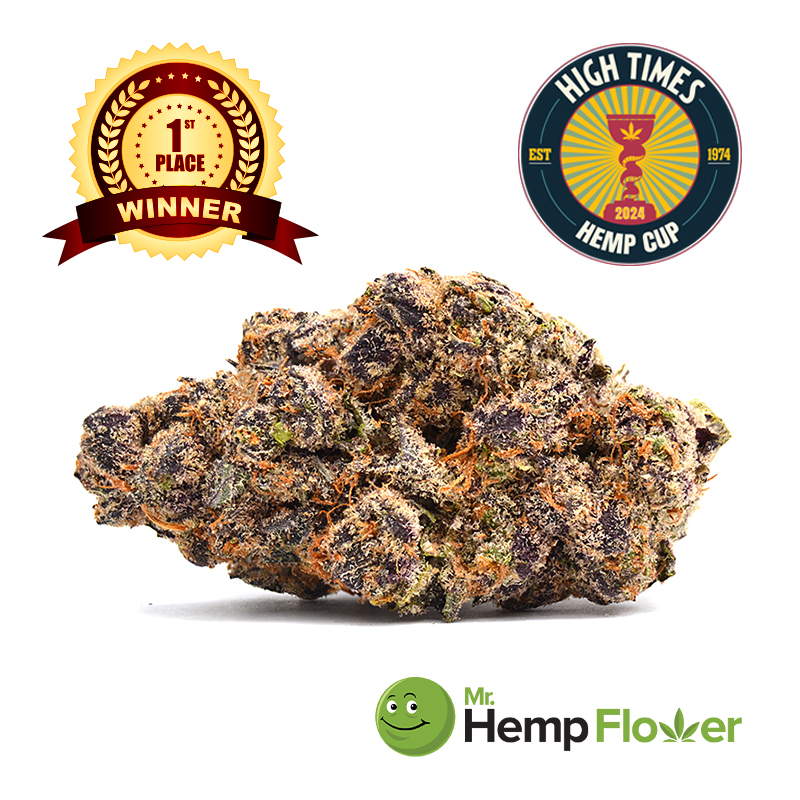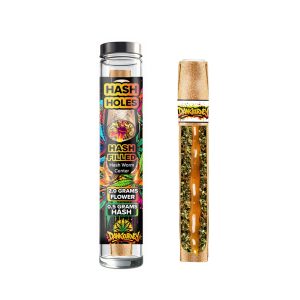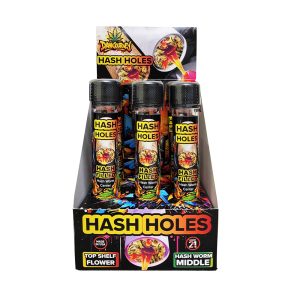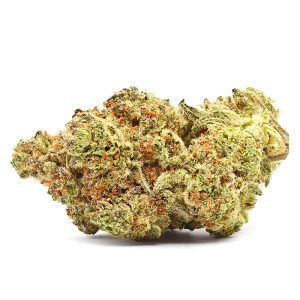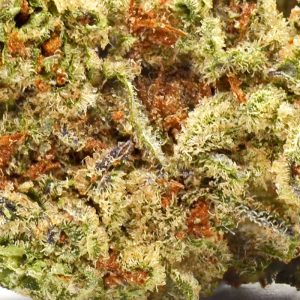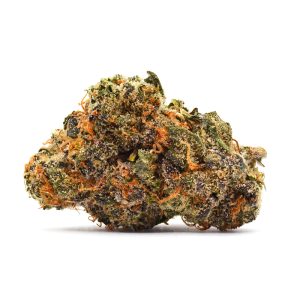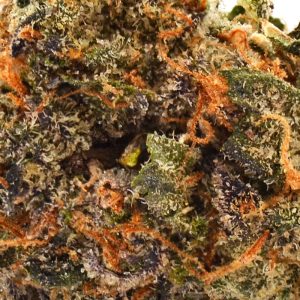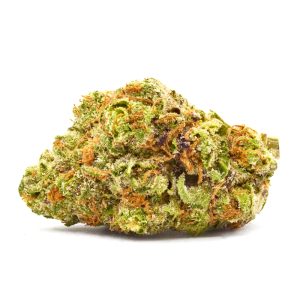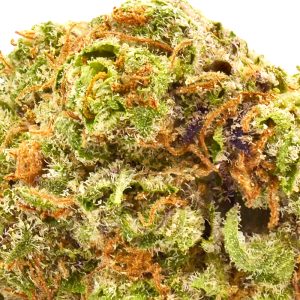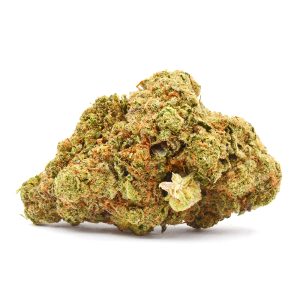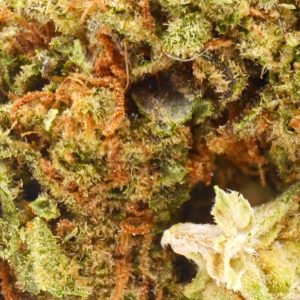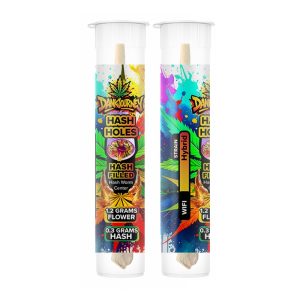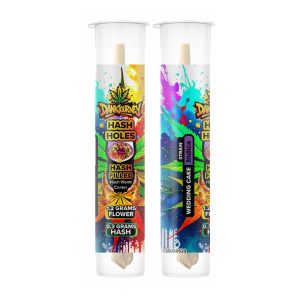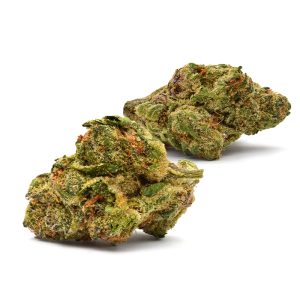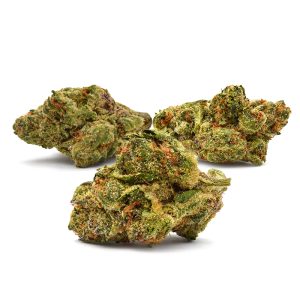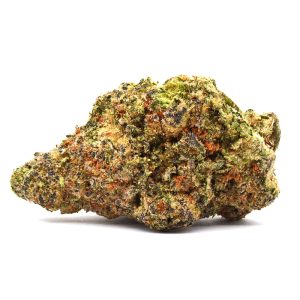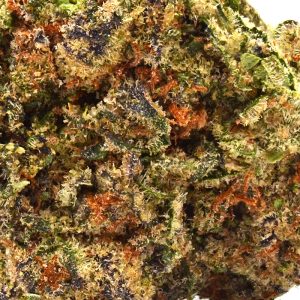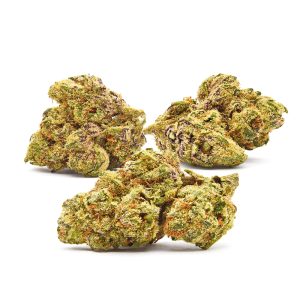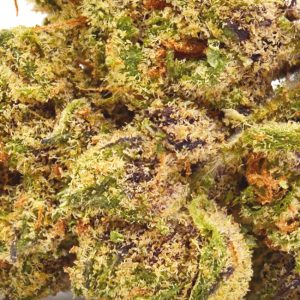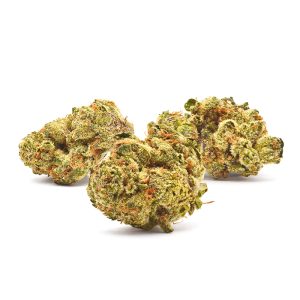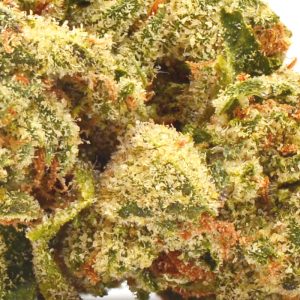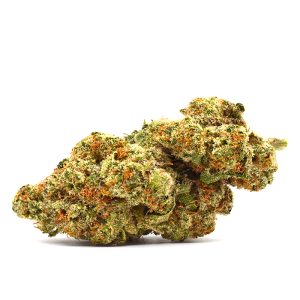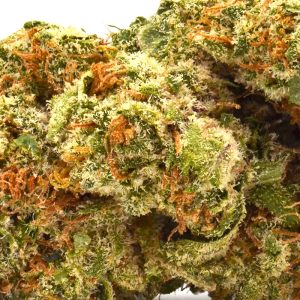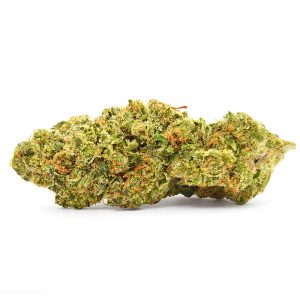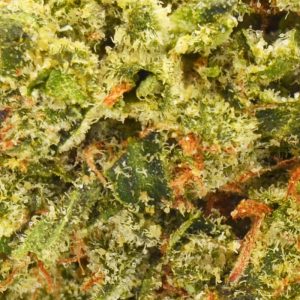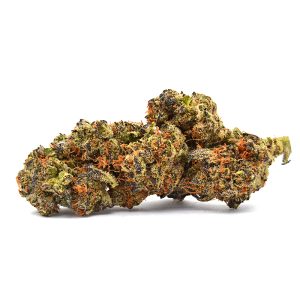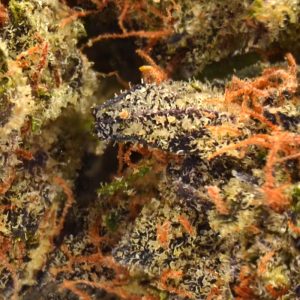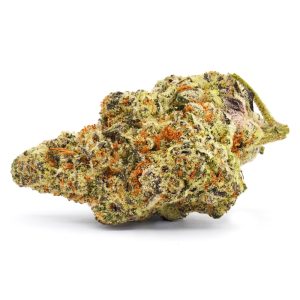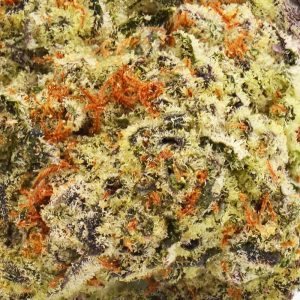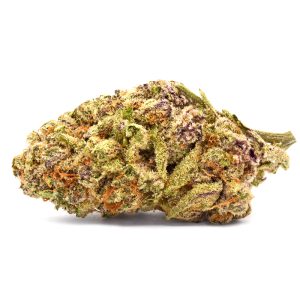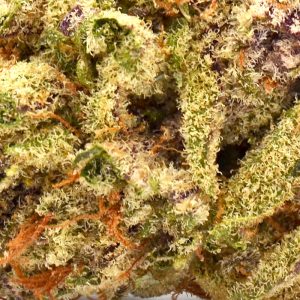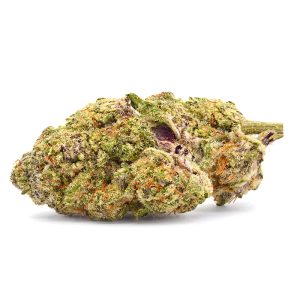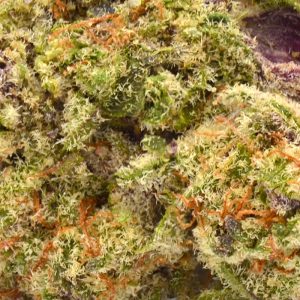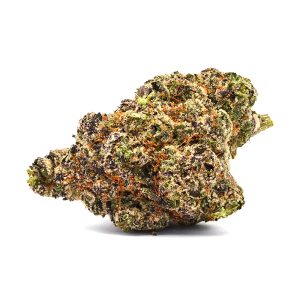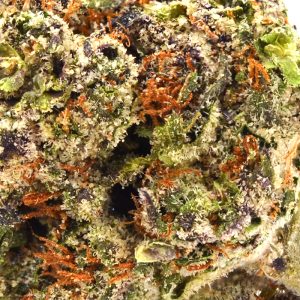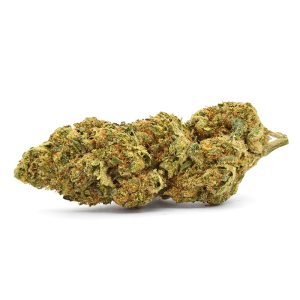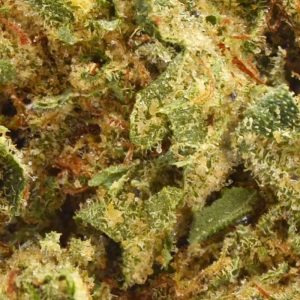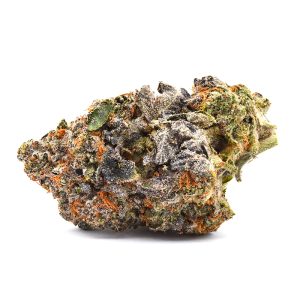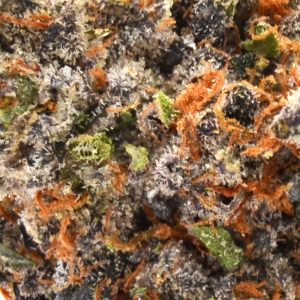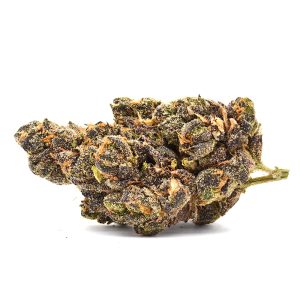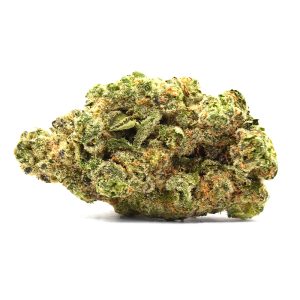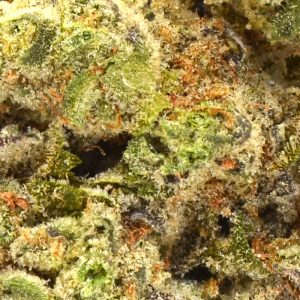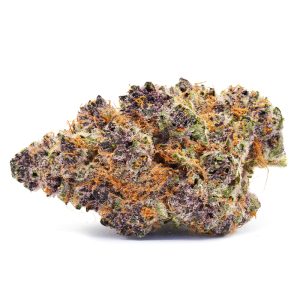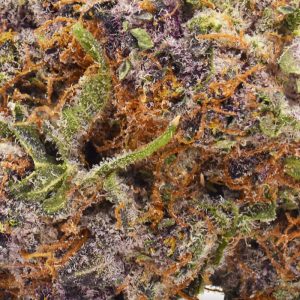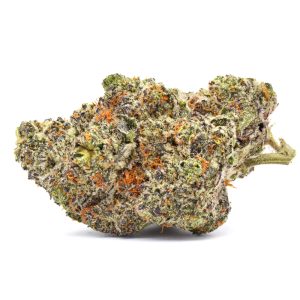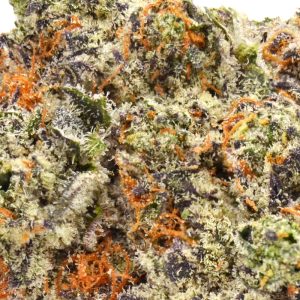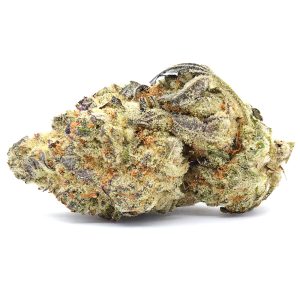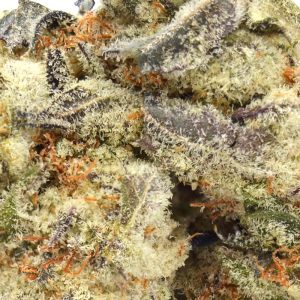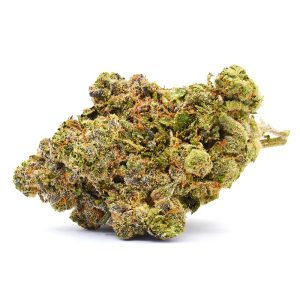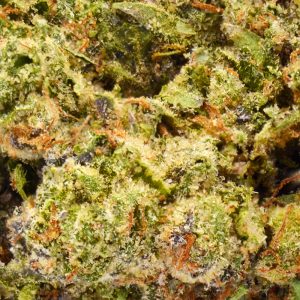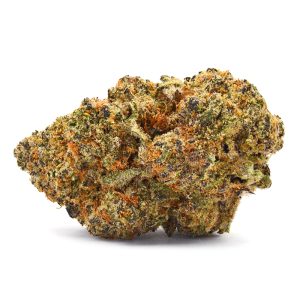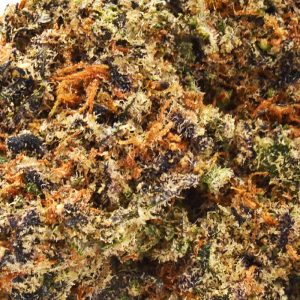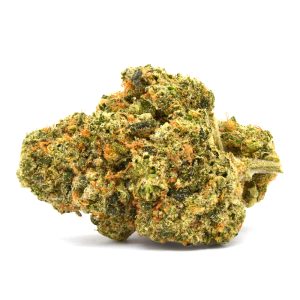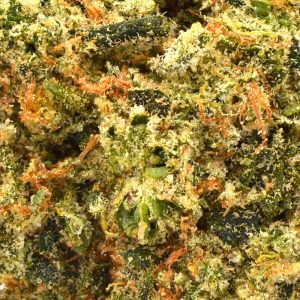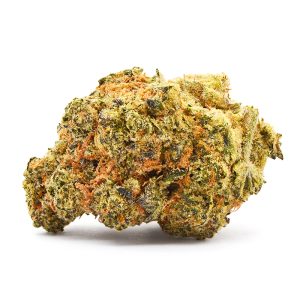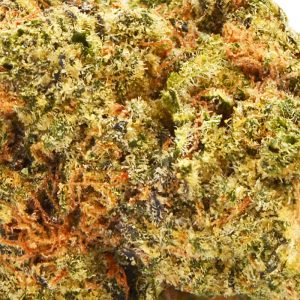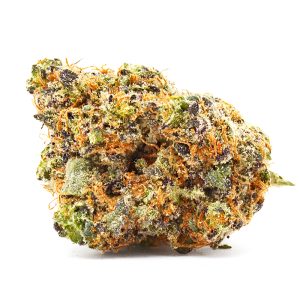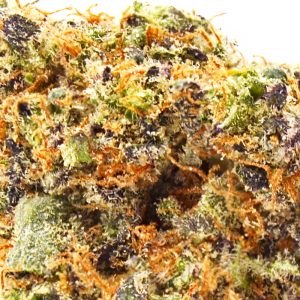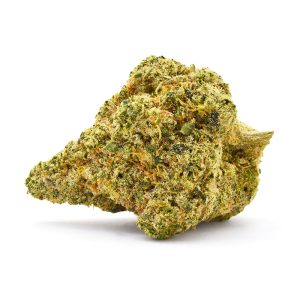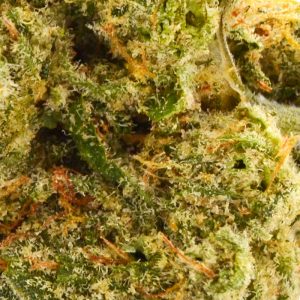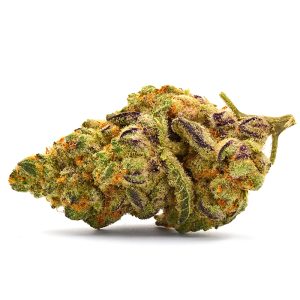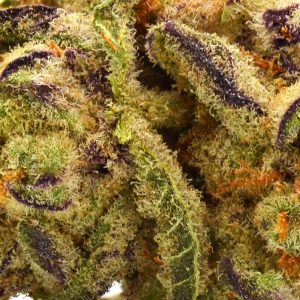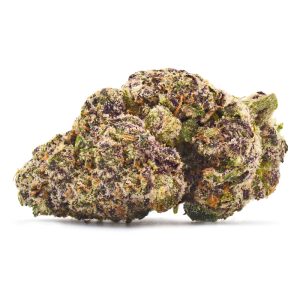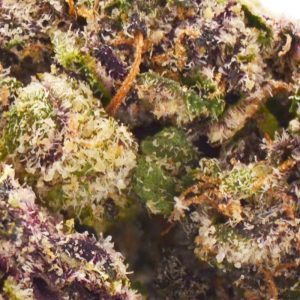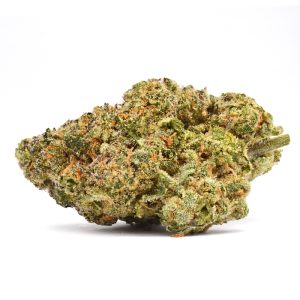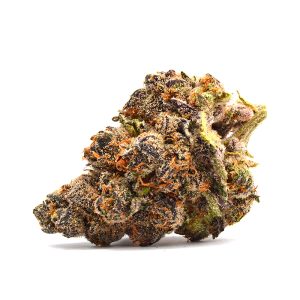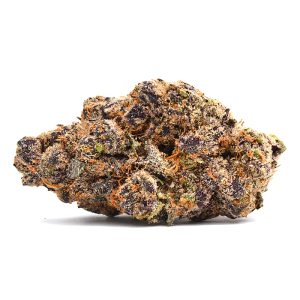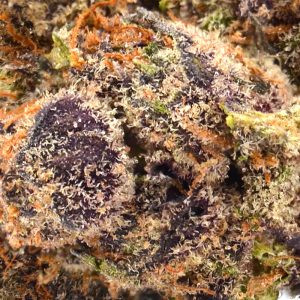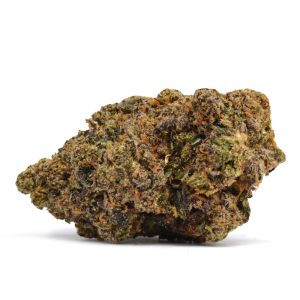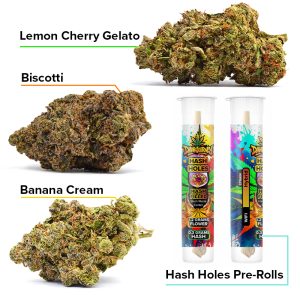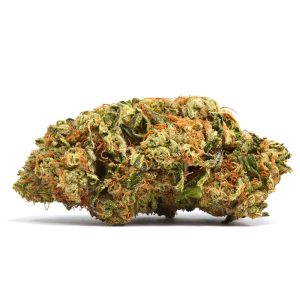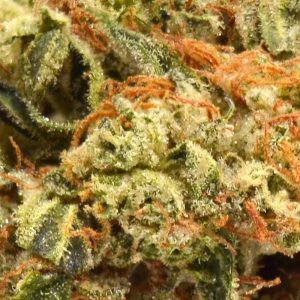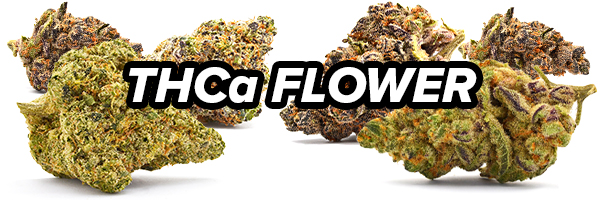
THCa Flower – Sativa, Indica and Hybrids
100% Legal Flower
USA-Grown Licensed Hemp Farms
Indica, Sativa, and Hybrid THCa Strains
20%-30% of Total THC Potency
Expertly Cultivated
Flower and 1 Gram THCa Prerolls Available
1st Place Winner of the High Times Hemp Cup! Peanut Butter Pie!!
THCa Flower Strains (Indica, Sativa & Hybrid)
Shop our full lineup of premium THCa flower — indoor, high-testing strains that look, smell, and smoke like top-shelf cannabis while remaining federally compliant under the 2018 Farm Bill. Browse by Indica, Sativa, or Hybrid below, then dive into guides and FAQs to learn how THCa works, how to decarb it, and how to stay on the right side of the law.
Shop THCa Flower by Effect Type
Choose your vibe: heavy Indica, uplifting Sativa, or balanced Hybrid THCa strains.
Indica THCa Flower
Best for night-time, body relaxation, and heavier “couch-lock” style effects.
Sativa & Uplifting THCa Flower
Great for daytime, creativity, focus, and mood elevation (dose carefully — still very strong).
Hybrid THCa Flower
Balanced strains that mix head and body effects — versatile for day or night depending on dose.
THCa Bundles, Infused Flower & Pre-Rolls
Explore curated bundles, infused CBD + THCa options, and diamond-infused THCa pre-rolls.
THCa Guides & Education
Learn how THCa works, how to use it safely, and how it fits into current laws.
THCa Flower FAQs
New to THCa? Start with these quick answers before choosing your strain above.
What is THCa flower?
THCa flower is hemp flower high in tetrahydrocannabinolic acid (THCa) instead of active THC. In its raw form it’s non-intoxicating, but when you smoke, vape, or bake it, heat converts THCa into Delta-9 THC (decarboxylation) and produces a classic cannabis-style high.
Does THCa flower get you high?
Yes — once it’s heated. Smoking, vaping, or decarbing in the oven converts THCa to THC. If you eat it raw (like juicing or sprinkling on food) you won’t get the same intoxicating effect.
Is THCa flower legal?
Under the 2018 Farm Bill, hemp products are federally legal if they contain ≤ 0.3% Delta-9 THC by dry weight. All Mr. Hemp Flower THCa strains are grown and tested to meet that standard. However, some states use “total THC” rules or restrict THCa directly, so always check your local laws before ordering.
Note: Laws are changing quickly. This page is for general information only and is not legal advice.
Will THCa show up on a drug test?
Assume yes. Once you heat THCa, your body processes it as THC, and most tests look for THC metabolites, not the original form. If you’re subject to testing, THCa flower is risky.
How do I choose between Indica, Sativa, and Hybrid?
As a simple rule: Indica = relaxing and body-heavy (great for nights), Sativa = uplifting and energizing (lighter, daytime use), and Hybrid = a mix of both. If you’re unsure, start with a balanced hybrid like Gary Payton or Peanut Butter Pie and use a low dose.
How strong are these THCa strains?
Many of our THCa strains test in the 25–39% THCa range, which is comparable to — or stronger than — a lot of dispensary cannabis once activated. If you’re new to high-THC products, take 1–2 small puffs, wait at least 10–15 minutes, and only then decide if you need more.
THCA Flower: Your Complete Guide to This Rising Cannabis Option in 2025
In the fast-paced world of cannabis, THCA flower is turning heads as a versatile choice for people wanting strong effects while staying within legal boundaries that often restrict traditional marijuana. Picture this: a product that looks and smells just like high-quality weed but comes from hemp, making it accessible in places where full THC isn't an option. If you're curious about diving into something new without the hassle of dispensary runs or strict state laws, THCA flower might be your next go-to.
At its heart, THCA flower refers to hemp buds loaded with tetrahydrocannabinolic acid (THCA), which doesn't get you high on its own but transforms into psychoactive THC when you apply heat. This dual nature is what makes it so appealing—use it raw for a subtle experience or smoke it for that classic buzz. In this guide, we'll break down what THCA flower really is, how it stacks up against THC, ways to use it, potential downsides, its legal standing right now, and what's on the horizon for this budding trend.
Key Takeaways
THCA flower is non-psychoactive in its raw form but converts to THC with heat.
It's federally legal if it stays under 0.3% Delta-9 THC, though states vary.
Popular for its versatility in smoking, edibles, and more.
Market is booming in 2025, with new strains hitting shelves amid regulatory shifts.
Whether you're a seasoned user or just exploring, understanding THCA flower in 2025 can help you make smarter choices.
What Is THCA Flower?
Let's get the basics straight: THCA flower isn't some exotic new invention—it's essentially the raw buds from hemp plants bred to have super high levels of THCA, the precursor to THC. THCA, or tetrahydrocannabinolic acid, is a cannabinoid that naturally occurs in the trichomes of fresh cannabis and hemp plants. These trichomes are those sticky, crystal-like bits that give the buds their frosty look.
The key thing here? In its uncooked state, THCA won't alter your mind like THC does. It's non-intoxicating, meaning you could munch on raw THCA flower all day without feeling that euphoric high. But introduce heat—through smoking, vaping, or even baking—and magic happens. This process, called decarboxylation, strips away a carboxyl group from THCA, turning it into Delta-9 THC, the compound famous for its psychoactive punch.
THCA flower typically comes from industrial hemp, which by law must contain less than 0.3% Delta-9 THC on a dry weight basis. That keeps it legal federally, but don't confuse it with low-potency CBD flower—these buds often pack 20-30% THCA, making them potent once activated. Visually and aromatically, it's indistinguishable from premium marijuana flower: dense nugs, pungent terpenes like pine or citrus, and that telltale stickiness.
Compared to standard cannabis flower from marijuana plants, THCA flower is often grown with compliance in mind. Growers might use remediation techniques to ensure low Delta-9 levels, which can sometimes tweak the terpene profile slightly. But users rave about the quality, especially with indoor-grown options that rival dispensary buds.
For decarboxylation, it's straightforward: Heat the flower to around 220-240°F for 30-45 minutes in an oven, or just light it up for instant conversion. Think of it as activating the potential locked inside.
THCA vs. THC: Key Differences
If you're new to this, the THCA-THC relationship can feel a bit confusing at first. Both come from the same plant family, but they're not interchangeable. THCA is the raw, acidic form found in living plants, while THC is what you get after processing or heating.
From what folks share online, like on forums and reviews, smoking THCA flower delivers effects pretty similar to THC-dominant weed—relaxation, creativity boosts, or whatever the strain leans toward—but the experience can vary based on quality and how well it's decarboxylated. One common myth? That THCA is always psychoactive. Nope, science says it's inert until that heat hits. Debunking that helps avoid surprises.
How to Use THCA Flower: Forms and Methods
One of the best parts about THCA flower is how flexible it is—you're not stuck with just one way to enjoy it. It comes in various formats to fit different lifestyles, from straightforward buds to more processed options.
Start with the classics: Raw flower buds or pre-rolls are perfect for those who like to grind and smoke. If you're after concentrates, THCA diamonds offer a purer, more intense hit. Then there are edibles, tinctures, and vapes for discreet use, plus topicals like creams for targeted application without any systemic effects.
Usage methods depend on what you're aiming for. For quick psychoactive results, smoking or vaping does the trick—it decarboxylates on the spot, delivering THC fast. Prefer non-psychoactive? Go raw: Juice the buds, toss them in salads, or blend into smoothies. Cooking is another fun route—infuse into oils or butter, but remember to decarb first if you want the high; aim for 220-240°F for about 30-45 minutes to avoid burning terpenes.
Strains make a difference too. Indica-leaning ones, like Skywalker OG, are great for winding down with their relaxing vibes. Sativa options, such as AK-47, bring energy and focus. Hybrids like Lemon Cherry Gelato offer a balanced mix, with flavors of sweet citrus and earth. Other hits in 2025 include Gelato and Cherry Kush for their potent profiles and tasty notes.
Storage is key to keeping it fresh: Use airtight glass jars in a cool, dark spot to prevent degradation from light or moisture. And for dosing, beginners should start small—maybe 5-10mg of THCA equivalent—to gauge tolerance.
Risks, Side Effects, and Precautions
No cannabis product is without its caveats, and THCA flower is no exception. When heated and converted to THC, it can cause side effects like dry mouth, red eyes, anxiety, or paranoia, especially in higher doses. Raw use might lead to milder issues, such as stomach upset if you're not used to it.
Bigger risks include failing a drug test—since THCA can turn into detectable THC in your system. Heavy use might build dependency or irritate lungs if smoking. Long-term, chronic THC exposure could affect mental health, like increasing anxiety in some people.
Play it safe: Talk to a doctor about interactions with meds, skip it if pregnant or underage, and always opt for lab-tested flower to dodge contaminants like pesticides. Start low and go slow to find your groove.
Legal Status of THCA Flower
As of August 2025, THCA flower hangs in a complex legal space. Federally, it's still okay under the 2018 Farm Bill as long as it's hemp-derived and under 0.3% Delta-9 THC by dry weight. That means you can ship it across most states.
But states are cracking down. Some, like those with "total THC" laws, count THCA toward the limit, effectively banning it. Places like Idaho outright restrict it, while Tennessee's status is shaky post-June. A federal proposal from June aims to ban hemp-derived THC products nationwide, including THCA, by redefining them. Always check local rules before buying, and stick to third-party tested, compliant sources to stay on the right side.
The Future of THCA Flower: Research and Trends
Heading into the latter half of 2025, THCA flower is riding a wave of popularity, with sales surging 50% in some markets as it outsells traditional hemp. Brands are dropping fresh strains like Lemon Cherry Gelato and Skywalker OG, focusing on exotic, high-potency indoor grows. Trends point to customization, smarter cultivation tech, and integration into wellness items like edibles.
Research is picking up steam too, with new studies on decarboxylation processes and plant matrix effects. Clinical trials are eyeing THCA for uses in pain, nausea, and neuroprotection, plus potential in forensics and veterinary apps. Regulatory changes loom, but if it navigates them, THCA could explode further.
Conclusion and FAQs
THCA flower stands out in 2025 as an accessible way to tap into cannabis-like experiences—raw for subtlety or heated for potency—all while mostly skirting federal restrictions. With its range of forms, strains, and methods, it's adaptable for just about anyone. As the market grows and research advances, keep an eye on updates to make the most of it.
Ready to try THCA flower? Do your homework and source wisely.
FAQs
Is THCA flower psychoactive?
Not until you heat it to convert to THC (by smoking it).
Will it show on a drug test?
Yes.
What's the strongest THCA strain?
Many hit around 30% THCA, like Lemon Cherry Gelato.
Is it safe?
Generally yes, but use responsibly and consult a pro if needed.
Aspect THCA THC
Psychoactive? No (raw); Yes (when heated) Yes
Found In Raw hemp/cannabis Decarboxylated cannabis
Activation Requires heat Already active
Effects Potential wellness support without high Euphoria, altered perception
Legality Federally legal (<0.3% THC) Restricted in many states
From what folks share online, like on forums and reviews, smoking THCA flower delivers effects pretty similar to THC-dominant weed—relaxation, creativity boosts, or whatever the strain leans toward—but the experience can vary based on quality and how well it's decarboxylated. One common myth? That THCA is always psychoactive. Nope, science says it's inert until that heat hits. Debunking that helps avoid surprises.
How to Use THCA Flower: Forms and Methods
One of the best parts about THCA flower is how flexible it is—you're not stuck with just one way to enjoy it. It comes in various formats to fit different lifestyles, from straightforward buds to more processed options.
Start with the classics: Raw flower buds or pre-rolls are perfect for those who like to grind and smoke. If you're after concentrates, THCA diamonds offer a purer, more intense hit. Then there are edibles, tinctures, and vapes for discreet use, plus topicals like creams for targeted application without any systemic effects.
Usage methods depend on what you're aiming for. For quick psychoactive results, smoking or vaping does the trick—it decarboxylates on the spot, delivering THC fast. Prefer non-psychoactive? Go raw: Juice the buds, toss them in salads, or blend into smoothies. Cooking is another fun route—infuse into oils or butter, but remember to decarb first if you want the high; aim for 220-240°F for about 30-45 minutes to avoid burning terpenes.
Strains make a difference too. Indica-leaning ones, like Skywalker OG, are great for winding down with their relaxing vibes. Sativa options, such as AK-47, bring energy and focus. Hybrids like Lemon Cherry Gelato offer a balanced mix, with flavors of sweet citrus and earth. Other hits in 2025 include Gelato and Cherry Kush for their potent profiles and tasty notes.
Storage is key to keeping it fresh: Use airtight glass jars in a cool, dark spot to prevent degradation from light or moisture. And for dosing, beginners should start small—maybe 5-10mg of THCA equivalent—to gauge tolerance.
Risks, Side Effects, and Precautions
No cannabis product is without its caveats, and THCA flower is no exception. When heated and converted to THC, it can cause side effects like dry mouth, red eyes, anxiety, or paranoia, especially in higher doses. Raw use might lead to milder issues, such as stomach upset if you're not used to it.
Bigger risks include failing a drug test—since THCA can turn into detectable THC in your system. Heavy use might build dependency or irritate lungs if smoking. Long-term, chronic THC exposure could affect mental health, like increasing anxiety in some people.
Play it safe: Talk to a doctor about interactions with meds, skip it if pregnant or underage, and always opt for lab-tested flower to dodge contaminants like pesticides. Start low and go slow to find your groove.
Legal Status of THCA Flower
As of August 2025, THCA flower hangs in a complex legal space. Federally, it's still okay under the 2018 Farm Bill as long as it's hemp-derived and under 0.3% Delta-9 THC by dry weight. That means you can ship it across most states.
But states are cracking down. Some, like those with "total THC" laws, count THCA toward the limit, effectively banning it. Places like Idaho outright restrict it, while Tennessee's status is shaky post-June. A federal proposal from June aims to ban hemp-derived THC products nationwide, including THCA, by redefining them. Always check local rules before buying, and stick to third-party tested, compliant sources to stay on the right side.
The Future of THCA Flower: Research and Trends
Heading into the latter half of 2025, THCA flower is riding a wave of popularity, with sales surging 50% in some markets as it outsells traditional hemp. Brands are dropping fresh strains like Lemon Cherry Gelato and Skywalker OG, focusing on exotic, high-potency indoor grows. Trends point to customization, smarter cultivation tech, and integration into wellness items like edibles.
Research is picking up steam too, with new studies on decarboxylation processes and plant matrix effects. Clinical trials are eyeing THCA for uses in pain, nausea, and neuroprotection, plus potential in forensics and veterinary apps. Regulatory changes loom, but if it navigates them, THCA could explode further.
Conclusion and FAQs
THCA flower stands out in 2025 as an accessible way to tap into cannabis-like experiences—raw for subtlety or heated for potency—all while mostly skirting federal restrictions. With its range of forms, strains, and methods, it's adaptable for just about anyone. As the market grows and research advances, keep an eye on updates to make the most of it.
Ready to try THCA flower? Do your homework and source wisely.
FAQs
Is THCA flower psychoactive? No, not until you heat it to convert to THC.
Will it show on a drug test? Possibly, if it converts to THC in your body.
What's the strongest THCA strain? Many hit around 30% THCA, like Lemon Cherry Gelato.
Is it safe? Generally yes, but use responsibly and consult a pro if needed.

